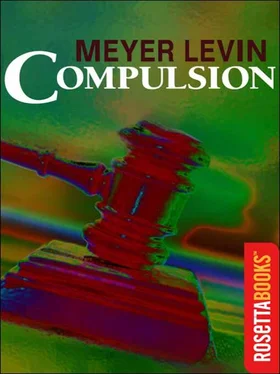Horn’s presence had intensity. There was never anything relaxed about him. He had an intensity, I suppose, beyond his capacity; otherwise he would have become a very important man. The drive was there.
“Do you want to admit now that these are your glasses?” he demanded in his shrill voice.
Judd retained his schoolboy smile. “I don’t want to admit any thing I’m not sure is so,” he said.
Horn went in again. “You know this looks serious, Mr. Steiner.”
“Indeed I do,” Judd said. “It’s quite embarrassing. They may even be my glasses. But after all, my family is quite well known. Judge Wagner is a friend of the Kesslers and he knows me quite well-”
“Do you want to talk to Judge Wagner?” Horn said.
“Well, he could tell you something about me.”
“All right.” Horn tilted his head to Padua. “Let’s get Judge Wagner on the line.”
They all subsided into a kind of neutrality while Padua tried the Judge’s home, and finally reached him at the Kesslers. Padua handed the phone to Judd.
“Judge Wagner,” he began, “this is Judah Steiner, Jr… Yes, fine, thank you. I’m calling you in rather unusual circumstances, from the State’s Attorney’s office, or rather his suite at the La Salle Hotel. They are investigating persons whose glasses resemble those found in the Kessler case, and mine happen to fit. Well, I thought, or my brother Max thought, you might want to say a word-” Smiling, he handed the phone to Horn. The least it could do, Judd told himself, was to keep them from pulling any rough stuff. If they didn’t lay hands on him, he was sure he could ride it through.
Charles Kessler leaned close in to Judge Wagner, listening. Their faces had the same expression, troubled, disappointed and yet persistent. Of all they had hoped for, when the glasses would be identified, only this had come.
Judge Wagner repeated that Judd was a brilliant boy, a Phi Beta Kappa at seventeen, a law student, and the son of one of the most respected men in Hyde Park. “Still, you have your investigation to make,” he said. “Let justice take its course.”
Sighing as he hung up, he said to Kessler, “No, this is really impossible. Some kind of accidental coincidence.”
Horn replaced the receiver, musing. Padua turned to Judd, as with a new thought. “Tell us this, Mr. Steiner – Judah-”
“My friends call me Judd.”
“Well, Judd, if I may – you say you’ve been out to Hegewisch?”
“I should say a couple of hundred times. As I told Captain Cleary, I was out there quite recently, the Sunday before this awful event. I even remembered running across the mouth of the culvert there. I was trying to get a shot at a species of crane, and I tripped.”
“You tripped?”
They were all staring at him. “Why yes, I recall it distinctly.” He waited for one of them to make the connection, and Padua obliged.
“You could have dropped your glasses then?”
“Well, it doesn’t seem probable. I don’t recall bringing them along. As I said, I hadn’t used them for a few months. Unless” – he reflected – “unless I had quite simply left them in the pocket of my jacket and entirely forgotten they were there.”
They all looked at each other. A chubby, silent one, in a corner, taking notes, he didn’t like.
“Well,” Padua said, with that impersonal air of having to go on until every detail was clarified, “when you saw all this in the papers about the glasses, and you knew you had been on the spot, and even had tripped there, didn’t it occur to you that these might be your glasses?”
The moment had come for a decision. “Well, no,” Judd said.
“No?”
Horn put in, “Didn’t you check up to see if you had your own glasses?”
“Well, even if it had occurred to me, I believe I would have avoided checking on it.”
“How’s that?” asked Padua.
“In a hysterical situation of this kind” – he laughed, a bit nervously – “one wouldn’t have wanted to risk having to get involved. I might even have had some silly notions about the third degree.”
They all chuckled. Then Horn said, “Now Judd, you, a law student, ought to know better than that.”
“There were stories about what was happening to that teacher.”
“What stories?”
“Well, I happen to be acquainted with a newspaperman on the case-”
They wanted to know what newspaperman. And what had the newspaperman said. Oh, he hadn’t said anything specific, but it was just one of those popular ideas.
“Well, all right. No one denies there is a lot of talk about the third degree.” In Padua ’s smile there was almost a hint of “you’ll see for yourself”. But he persisted, “So even as a law student, you didn’t think it your duty to check whether they were your glasses, so you could identify them and save the state a lot of trouble if they were. And you also must have realized that in the meantime we were running down false clues, and giving the real culprit more opportunity to get away.”
“There might have been a question in the back of my mind,” Judd said. “But in the situation-”
Horn said, “Then you admit now that these are your glasses?”
“Why, I can’t say for sure. It could be possible.”
A point had been reached. There was a prodigious relaxation in the room; the note-taker put down his book; men moved around; Horn whispered something to McNamara, who went out.
So they had pinned that on him. But what was it? Nothing. His explanation was perfectly logical. There were half a dozen witnesses to vouch that he had been out to Hegewisch that Sunday, birding.
Horn stood up, crossed the room in the most casual way – oh what a cheap show they were putting up; wait till he imitated Horn for Artie! Horn took the glasses from the case, and put them in his breast pocket. “You carried them in your pocket like this?”
“Why, yes, that was where I would habitually carry them. I could have left them in the pocket of my jacket. I hadn’t worn the suit for some weeks. But – I believe it is this suit I have on now.”
Suddenly Horn performed a curious little shuffle with his feet, and half flopped over, like a vaudeville dancer in a buck-and-wing, nearly losing his balance. Startled, Padua and the others lunged to catch their chief. But Horn steadied himself, grasping the back of a chair. He straightened up. Then he touched his hand to his breast pocket. The glasses were still there, intact. “Would you like to show me, Judd, how you might have fallen, and the glasses dropped out? Especially since you have on the same suit.”
“Why, it seems to me that when I did use them habitually, they were always falling out of my pockets when I bent over.” Horn was holding out the spectacles. Judd slipped them into his coat pocket, smiling.
“How did they fall? Will you show us?”
“Well, I’m not much of an actor,” he said, chuckling.
“Just let’s see if they fall out.”
“Well, the terrain isn’t exactly the same, you know. I tripped, I think it was down an incline, down the overpass of the railway tracks there.”
“You do know the site quite well,” Padua remarked.
“Still,” Horn said, “let’s give it a try.”
With a slight frown at being put in a situation where he had to make a fool of himself, Judd made a few steps toward the centre of the room, and then fell forward, landing on his palms. As he straightened himself, he had difficulty concealing an angry sense of humiliation. But he made himself chuckle. “Of course when you try it never happens.”
They smiled with him.
Padua now came forward and arranged a little pile of stuff in the middle of the floor; there were a couple of telephone books, with a few smaller books on top.
Читать дальше












